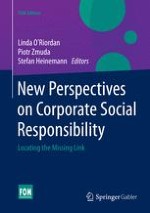2015 | OriginalPaper | Buchkapitel
20. The Role of Employees in Implementing CSR Strategies
verfasst von : Dr. Lara Johannsdottir, Prof. Dr. Snjolfur Olafsson
Erschienen in: New Perspectives on Corporate Social Responsibility
Verlag: Springer Fachmedien Wiesbaden
Aktivieren Sie unsere intelligente Suche, um passende Fachinhalte oder Patente zu finden.
Wählen Sie Textabschnitte aus um mit Künstlicher Intelligenz passenden Patente zu finden. powered by
Markieren Sie Textabschnitte, um KI-gestützt weitere passende Inhalte zu finden. powered by
